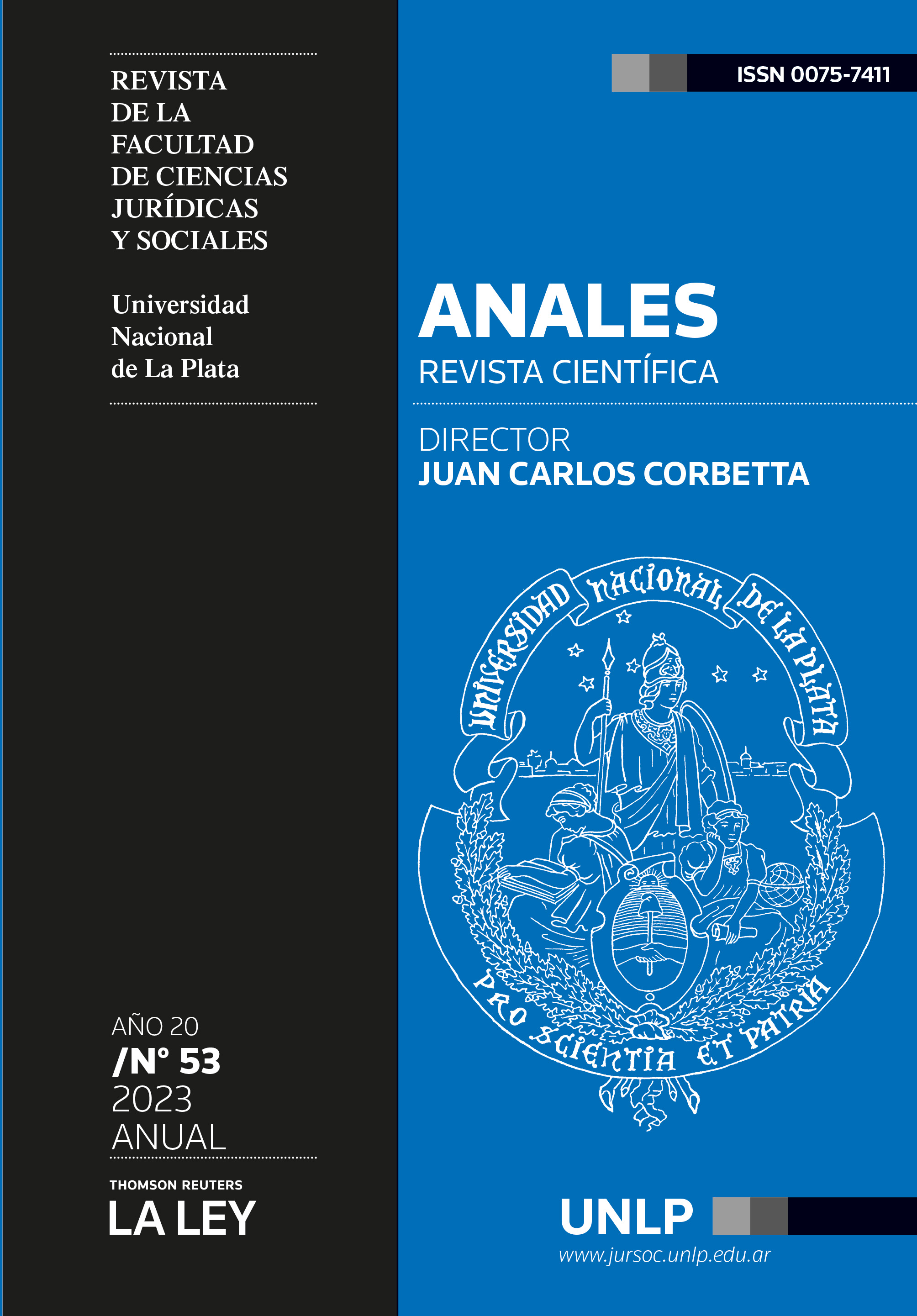Tolerating is hateful: The construction of a discourse
DOI:
https://doi.org/10.24215/25916386e157Keywords:
freedom, expression, tolerance , hate , discriminationAbstract
Freedom of expression and opinion have been affected by the multiplicity of channels through which it can be exercised. The awareness that the international community has become aware of this has stimulated the need to control what is considered hate speech. Observing the tension that arises between freedom of expression, honor and human dignity and the rights of collectives in this new era of communicative diversity poses a new challenge that States must face without violating those freedoms that are natural to humanity.
Downloads
References
Arendt, H. (2015). Sobre la Violencia. Alianza Editorial.
Asian Institute of Human Rights (2020). Violence Triangle of Johan Galtung in Context of Conflict Theory. https://www.aihrhre.org/understanding-violence-triangle-johan-galtung-conflict-theory/
Barak, A. (2013). Human Dignity: The Constitutional Value and the Constitutional Right. En A. Barak (2015), Human Dignity. The Constitutional Value and the Constitutional Right (trad. D. Kayros). Cambridge University Press.
Coleman, P. (2018). La Censura maquillada. Cómo las leyes contra el “discurso de odio” amenazan la libertad de expresión. Editorial Dykinson S.L.
Convención Interamericana contra el Racismo, la Discriminación Racial y formas conexas de Intolerancia.
http://www.oas.org/es/sla/ddi/docs/tratados_multilaterales_interamericanos_A-68_racismo.pdf
Convención Internacional sobre la Eliminación de todas las Formas de Discriminación Racial ODS-DOC Sistema Oficial de documentación de Naciones Unidas (ODS – DOC) https://www.ohchr.org/es/instruments-mechanisms/instruments/international-convention-elimination-all-forms-racial
De Tocqueville, A. (2017). La democracia en América, Parte 1. Editorial Alianza.
Fourest, C. (2021). Generación Ofendida. De la policía de la cultura a la policía del pensamiento. Libros del Zorzal
Fukuyama, F. (2019). Identidad. La demanda de dignidad y las políticas de resentimiento. Deusto Editorial.
Geertz, C. (1994). Conocimiento Local. Ensayo sobre la interpretación de las culturas. Paidos.
Glensy, R. D. (2011). The right to dignity. Columbia Human Rights Law Review
Global Freedom of Expression Columbia University (2016). Libertad de Expresión y Seguridad Nacional: Equilibrio para la protección. https://globalfreedomofexpression.columbia.edu/wp-content/uploads/2016/01/A-Callamard-Securite-Nationale-et-FoE-French-2.pdf
Grimm, D. (2013). Dignity in a Legal Context: Dignity as an Absolute Right. En C. McCrudden (ed.), Understanding Human Dignity (pp. 381-392). British Academy. https://doi.org/10.5871/bacad/9780197265642.003.0021
Diario Perfil, 7 de septiembre de 2022. Ley del odio: declaraciones contrapuestas en el Gobierno con un proyecto que no existe.
Levaggi, A. (1988). Cuadernos de investigaciones (5). http://www.derecho.uba.ar/investigacion/Cuadernos_de_Investigacion5.pdf
Locke, J. (2016). Carta sobre la tolerancia (1689). Editorial Tecnos.
McCrudden, C. (2008). Human dignity and judicial interpretation of human rights. European Journal of International Law. https://doi.org/10.1093/ejil/chn043
McCrudden, C. (2008). Understanding Human Dignity. British Academy. https://doi.org/10.5871/bacad/9780197265642.003.0020
Organización de Estados Americanos. Convención Interamericana contra toda forma de Discriminación e Intolerancia. http://www.oas.org/es/sla/ddi/docs/tratados_multilaterales_interamericanos_A-69_discriminacion_intolerancia.pdf
Orwell, G. (1949). 1984. https://www.philosophia.cl/biblioteca/orwell/1984.pdf
Parekh, B. (2006). Hate speech. Is there a case of banning? https://onlinelibrary.wiley.com/doi/10.1111/j.1070-3535.2005.00405.x
Pacto Internacional de Derechos Civiles y Políticos. ohchr.org
Oficina del Alto Comisionado de las Naciones Unidas para los Derechos Humanos
Plan de acción de Rabat Oficina del Alto Comisionado de las Naciones Unidas para los Derechos Humanos. article19.org
Ring Carlson, C. (2021). El discurso del odio. Cátedra.
Stuart Mill, J.(2022).Sobre la Libertad. Editorial Losada.
Temperman J. (2012). Blasphemy, Defamation of Religions & Human Rights Law https://papers.ssrn.com/sol3/papers.cfm?abstract_id=2041292.
Valiente Martinez, F. (2020). La democracia y el discurso de odio. Límites constitucionales a la libertad de expresión. Editorial Dykinson S.L.
Ley Nº 17.722. Boletín Oficial de la República Argentina, Buenos Aires, 08/05/1968.
Decreto Ley Nº 6.286, 09/04/1956. No fue publicada en el Boletín Oficial.
Ley Nº 23.054. Boletín Oficial de la República Argentina, Buenos Aires, 27/03/1984.
Ley Nº 23.313. Boletín Oficial de la República Argentina, Buenos Aires, 13/05/1986.
Ley Nº 23.592, Actos Discriminatorios. Boletín Oficial de la República Argentina, Buenos Aires, 05/09/1988.
Ley Nº 24.782, Actos Discriminatorios. Boletín Oficial de la República Argentina, Buenos Aires, 03/04/1997.
Downloads
Additional Files
Published
How to Cite
Issue
Section
License
Copyright (c) 2023 Debora Cecilia Bursztyn

This work is licensed under a Creative Commons Attribution-NonCommercial-NoDerivatives 4.0 International License.
Esta licencia no permite la generación de obras derivadas ni hacer un uso comercial de la obra original, es decir, sólo son posibles los usos y finalidades que no tengan carácter comercial.






























